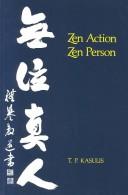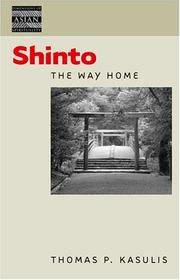| Listing 1 - 10 of 28 | << page >> |
Sort by
|

ISBN: 0824807022 Year: 1981 Publisher: Honolulu University of Hawaii press
Abstract | Keywords | Export | Availability | Bookmark
 Loading...
Loading...Choose an application
- Reference Manager
- EndNote
- RefWorks (Direct export to RefWorks)
Zen Buddhism --- Buddhist philosophy --- Bouddhisme zen --- Philosophie bouddhique --- Doctrines --- S35/1026 --- Philosophy, Buddhist --- -#SML: Joseph Spae --- Chʻan Buddhism --- Dhyāna (Sect) --- Zen --- Zen (Sect) --- Buddhism --- Mahayana Buddhism --- Philosophy --- Buddhism and philosophy --- Japan--Buddhist sects: Zen --- #SML: Joseph Spae

ISBN: 0824827945 082482850X 9780824827946 9780824828509 Year: 2004 Publisher: Honolulu University of Hawaii press
Abstract | Keywords | Export | Availability | Bookmark
 Loading...
Loading...Choose an application
- Reference Manager
- EndNote
- RefWorks (Direct export to RefWorks)
Shinto. --- J1940 --- Japan: Religion -- Shintō in general --- J1910 --- Japan: Religion -- Shintō -- general and history --- Shinto --- Religions
Book
ISBN: 9780824874070 9780824869793 0824869796 0824874072 Year: 2024 Publisher: Honolulu, Hawaii University of Hawaiʻi Press
Abstract | Keywords | Export | Availability | Bookmark
 Loading...
Loading...Choose an application
- Reference Manager
- EndNote
- RefWorks (Direct export to RefWorks)
Philosophy challenges our assumptions-especially when it comes to us from another culture. In exploring Japanese philosophy, a dependable guide is essential. The present volume, written by a renowned authority on the subject, offers readers a historical survey of Japanese thought that is both comprehensive and comprehensible. Adhering to the Japanese philosophical tradition of highlighting engagement over detachment, Thomas Kasulis invites us to think with, as well as about, the Japanese masters by offering ample examples, innovative analogies, thought experiments, and jargon-free explanations. He assumes little previous knowledge and addresses themes-aesthetics, ethics, the samurai code, politics, among others-not in a vacuum but within the conditions of Japan's cultural and intellectual history. For readers new to Japanese studies, he provides a simplified guide to pronouncing Japanese and a separate discussion of the language and how its syntax, orthography, and linguistic layers can serve the philosophical purposes of a skilled writer and subtle thinker. For those familiar with the Japanese cultural tradition but less so with philosophy, Kasulis clarifies philosophical expressions and problems, Western as well as Japanese, as they arise. Half of the book's chapters are devoted to seven major thinkers who collectively represent the full range of Japan's historical epochs and philosophical traditions: Kukai, Shinran, Dogen, Ogyu Sorai, Motoori Norinaga, Nishida Kitaro, and Watsuji Tetsuro. Nuanced details and analyses enable an engaged understanding of Japanese Buddhism, Confucianism, Shinto, and modern academic philosophy. Other chapters supply social and cultural background, including brief discussions of nearly a hundred other philosophical writers. (For additional information, cross references to material in the companion volume Japanese Philosophy: A Sourcebook are included.) In his closing chapter Kasulis reflects on lessons from Japanese philosophy that enhance our understanding of philosophy itself. He reminds us that philosophy in its original sense means loving wisdom, not studying ideas. In that regard, a renewed appreciation of engaged knowing can play a critical role in the revitalization of philosophy in the West as well as the East.
Philosophy, Japanese --- History --- Philosophie. --- Philosophy, Japanese. --- History. --- Japan. --- J1008 --- J1000 --- J1809 --- Japan: Philosophy -- history and biography --- Japan: Philosophy --- Japan: Religion -- Buddhism -- theory, methodology and philosophy --- Japan: Philosophy -- history --- History of philosophy --- Japan

ISBN: 0824824768 0824825594 9780824825591 9780824824761 Year: 2002 Publisher: Honolulu (Hawaii) : University of Hawaii press,
Abstract | Keywords | Export | Availability | Bookmark
 Loading...
Loading...Choose an application
- Reference Manager
- EndNote
- RefWorks (Direct export to RefWorks)
Integrity. --- Intimacy (Psychology) --- Culture --- Philosophy. --- Intimacy (Psychology). --- Culture - Philosophy.
Book
ISBN: 0824864301 Year: 2004 Publisher: Honolulu : University of Hawaii Press,
Abstract | Keywords | Export | Availability | Bookmark
 Loading...
Loading...Choose an application
- Reference Manager
- EndNote
- RefWorks (Direct export to RefWorks)
Nine out of ten Japanese claim some affiliation with Shinto, but in the West the religion remains the least studied of the major Asian spiritual traditions. It is so interlaced with Japanese cultural values and practices that scholarly studies usually focus on only one of its dimensions: Shinto as a "nature religion," an "imperial state religion," a "primal religion," or a "folk amalgam of practices and beliefs." Thomas Kasulis' fresh approach to Shinto explains with clarity and economy how these different aspects interrelate.As a philosopher of religion, he first analyzes the experiential aspect of Shinto spirituality underlying its various ideas and practices. Second, as a historian of Japanese thought, he sketches several major developments in Shinto doctrines and institutions from prehistory to the present, showing how its interactions with Buddhism, Confucianism, and nationalism influenced its expression in different times and contexts. In Shinto's idiosyncratic history, Kasulis finds the explicit interplay between two forms of spirituality: the "existential" and the "essentialist." Although the dynamic between the two is particularly striking and accessible in the study of Shinto, he concludes that a similar dynamic may be found in the history of other religions as well. Two decades ago, Kasulis' Zen Action/Zen Person brought an innovative understanding to the ideas and practices of Zen Buddhism, an understanding influential in the ensuing decades of philosophical Zen studies. Shinto: The Way Home promises to do the same for future Shinto studies.

ISBN: 0824810236 Year: 1985 Publisher: Honolulu University of Hawaii press
Abstract | Keywords | Export | Availability | Bookmark
 Loading...
Loading...Choose an application
- Reference Manager
- EndNote
- RefWorks (Direct export to RefWorks)
Book
ISBN: 0824845161 0585274355 Year: 1981 Publisher: Honolulu : University Press of Hawaii,
Abstract | Keywords | Export | Availability | Bookmark
 Loading...
Loading...Choose an application
- Reference Manager
- EndNote
- RefWorks (Direct export to RefWorks)
Book
ISBN: 9780824845162 Year: 2021 Publisher: Honolulu
Abstract | Keywords | Export | Availability | Bookmark
 Loading...
Loading...Choose an application
- Reference Manager
- EndNote
- RefWorks (Direct export to RefWorks)
Book
ISBN: 9780824863012 Year: 2002 Publisher: Honolulu
Abstract | Keywords | Export | Availability | Bookmark
 Loading...
Loading...Choose an application
- Reference Manager
- EndNote
- RefWorks (Direct export to RefWorks)
Book
ISBN: 9780824864309 Year: 2004 Publisher: Honolulu
Abstract | Keywords | Export | Availability | Bookmark
 Loading...
Loading...Choose an application
- Reference Manager
- EndNote
- RefWorks (Direct export to RefWorks)
| Listing 1 - 10 of 28 | << page >> |
Sort by
|

 Search
Search Feedback
Feedback About UniCat
About UniCat  Help
Help News
News